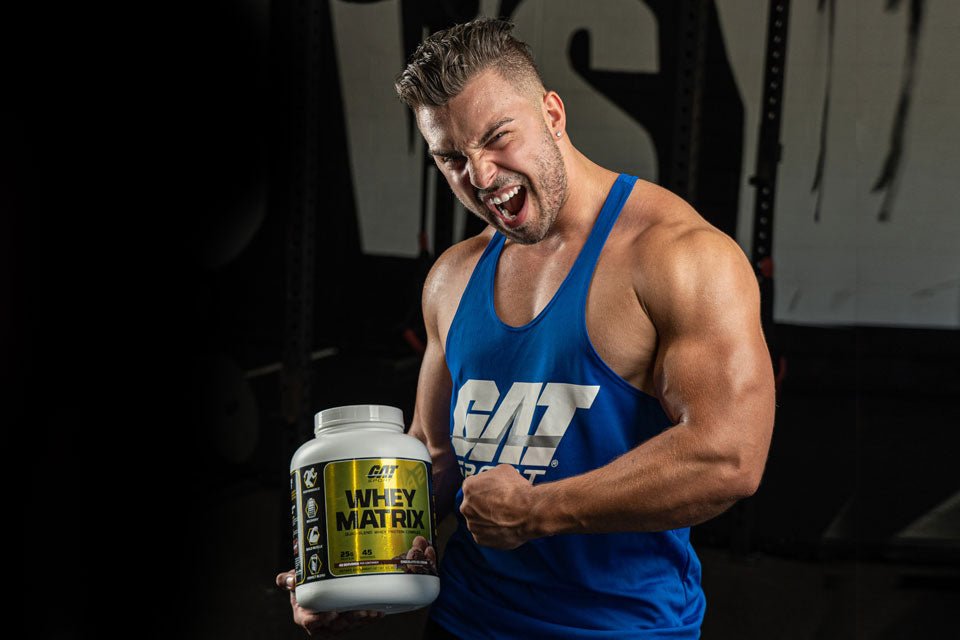The Ultimate Guide to Whey Protein

Sooner or later, your gym buddies will say it.
They’ll mention whey protein, and that people use it to build muscle.
If you’re close to the bodybuilding world, you might be wondering why they speak so glowingly about it. It can be a great thing for you to learn more about. So, let’s simplify and demystify it!
WHAT EXACTLY IS WHEY PROTEIN ANYWAY?
When the liquid part of milk is separated during cheese production, whey protein is produced. It’s that simple. Milk contains 80% casein and 20% whey. And, there are beneficial proteins in that isolated quantity separated from the whey. Hence the name: Isolated Whey Protein.
Whey is what’s found in the watery portion of milk and yogurt. In fact, if you’ve ever pulled back the top on a cup of yogurt and noticed the milky residue on top, that’s whey.
NOW, WHAT WILL WHEY PROTEIN DO FOR ME?
Since whey protein contains protein, it also makes one of the most popular protein supplements around! But there are many great reasons to invite whey protein into your regimen.
Whey protein contains many vital nutrients and is one of the best-studied proteins in the world. Studies detail how it can help increase strength and muscle, while it can also help decrease body fat.
In the body, protein is used to build muscle and repair tissue. Protein helps create enzymes and hormones, and works to regulate body chemicals. In bone, muscle, cartilage, skin, and blood, protein is an important building block. It contains essential amino acids, which are quickly absorbed by the body.
IT CAN HELP WITH WEIGHT LOSS
Increasing your protein intake helps you maintain your weight, and help to increase weight loss. Consuming whey is a convenient approach to adding beneficial extra protein to your diet. Studies show that when you replace calories with whey protein while increasing your weight training, you can lose up to 8 pounds while increasing lean muscle mass.
Whey protein helps decrease appetite and hunger. It’s a very filling food — the most filling of the three macronutrients carbohydrates, protein, and fat. It boosts metabolism. That helps burn more calories throughout the day. And it helps increase muscle mass even though you’re losing weight.
PEA PROTEIN VS WHEY PROTEIN: WHAT'S THE DIFFERENCE?
If you're looking for a plant-based alternative to whey, you might be wondering about the difference between pea protein vs whey protein. Pea protein is made from yellow split peas and is entirely plant-based, making it suitable for vegans. Whey protein, on the other hand, is derived from milk and contains all nine essential amino acids, offering more complete nutrition for muscle growth.
Both types of protein have their benefits. Pea protein is ideal for those with lactose intolerance or allergies, while whey protein is more quickly absorbed, making it a popular choice for post-workout recovery.
WHEY PROTEIN HAS ANTI-CANCER PROPERTIES
Protein has a central role in helping with cellular repair. It helps regulate body function by supplying the body with amino acids. Among them, the most important amino acid helps produce glutathione, a key antioxidant in fighting off oxidation and cutting the risk of chronic diseases.
Glutathione’s production depends on the amino acid supply in the body, so when you take whey protein, your body may be boosting its ability to provide antioxidant defense.
FLAVORS: CHOOSING THE RIGHT WHEY PROTEIN POWDER
In addition to the many health benefits, whey protein is available in various flavors, making it easier to incorporate into your daily routine. Many athletes prefer vanilla whey protein powder for its versatile flavor that can easily mix with smoothies, shakes, or even baked goods. Vanilla provides a neutral yet tasty option that pairs well with many different ingredients.
IS WHEY PROTEIN GLUTEN-FREE?
One of the most common questions asked is, is whey protein gluten-free? For those who are sensitive to gluten or have celiac disease, the good news is that most whey protein powders, especially whey protein isolates, are naturally gluten-free. However, always check the label for any added ingredients that may contain gluten to be sure.
IS WHEY PROTEIN VEGETARIAN?
Another frequently asked question is, is whey protein vegetarian? The answer is yes. Whey protein is derived from milk, making it suitable for vegetarians who include dairy in their diets. However, it's important to note that it is not vegan since it's a byproduct of cheese-making.
PLUS, IT LOWERS CHOLESTEROL, HELPS WITH ASTHMA, BLOOD PRESS AND EVEN CARDIOVASCULAR DISEASE.
Studies have shown that whey protein helps lower cholesterol. An International Journal of Food Science and Nutrition study showed that using whey protein helped suppress asthma in children. High blood pressure and cardiovascular disease often go hand in hand. Studies show that whey protein may even help reduce high blood pressure. That, in turn, helps improve cardiovascular health.
Incredibly, with all those benefits, there are a lot of whey protein myths out there. So, get the facts!
Check out this article: 9 Protein Powder Myths You Should Stop Believing Today.
LET'S TALK QUANTITY: HOW MUCH PROTEIN DO YOU NEED EVERY DAY?
Well, the ideal amount of protein to be consume every day mainly depends on your weight and your level of activity. On average, you should eat 1.6 to 2.2 grams of protein per kilogram of body weight. But, if you work out every day, it’s more like 2.2 to 3.4 grams of protein per kilogram of body weight. Do the math, and that’s a decent amount of protein daily!
TYPES OF WHEY PROTEIN: HYDROLYZED, CONCENTRATE, AND ISOLATE
Whey protein comes in three main forms: concentrate, isolate, and hydrolyzed whey protein. Hydrolyzed whey is pre-digested, meaning it has been broken down into smaller chains of amino acids, making it easier and faster for your body to absorb. This is especially beneficial for post-workout recovery when your muscles need quick replenishment.
So, get to know the three kinds of protein:
- Concentrate: Concentrate has its diluting elements removed. Whey protein concentrate retains small amounts of fat and carbohydrates.
- Hydrolysate: It’s partially broken down (“predigested”) amino acids. It can be faster absorbed, faster-acting, and fast-digesting.
- Isolate: Whey protein processed to remove all fat and lactose is Isolate. A whey protein isolate is about 90% protein.
And, there’s more delicious news! GAT Sport has blended all the best attributes of whey protein into its premier proteins. Let’s get to know them and understand their advantages.
TRY BEFORE YOU BUY: PROTEIN SUPPLEMENT SAMPLES
Not sure which protein powder is right for you? Many brands offer protein supplement samples so you can try different flavors and types before committing to a full-sized product. This is a great way to ensure you're getting a product that fits your taste and dietary needs.
WANT A FAST-ABSORBING WHEY PROTEIN COMPLEX THAT IS PACKED WITH HIGH-QUALITY PROTEINS?
Whey Matrix supplements your diet, delivering all the health and performance benefits you’re looking for. Whey protein promotes muscle growth through improved strength and accelerated recovery, both in the gym and on the field.† Whey is high in all 9 essential amino acids (EAAs) emphasizing the branched-chain amino acids (BCAAs). Proper supplementing with whey protein is shown to decrease fat mass while increasing muscle mass. GAT Whey Matrix is the perfect one-two punch when it comes creating to a healthier and leaner, more well-toned physique!†
MOUTH-WATERING FLAVORS
This high quality protein source delivers on rich thickness and flavors, for an amazing taste that’s intensely delicious. You’ve worked so hard, enjoy GAT Sport Whey Matrix as your reward.
THE STORY OF WHEY PROTEIN AND MUSCLE MASS
Why is drinking whey protein shakes to help power training so popular among dedicated athletes? As demonstrated above, it’s much more than just taste. Whey protein is well known for its ability to increase muscle mass and strength. To summarize, whey protein help build muscle mass increases with:
Protein and Amino Acids: Protein and amino acids are the building blocks for the body. That means they directly help increase muscle growth.
Hormones: Protein helps many different areas of the body. It helps stimulate anabolic hormones, which, like insulin, helps muscle grow.
Leucine: An amino acid known to help muscle growth.
Fast absorption: It’s the reason whey protein is considered high-quality protein. It gets to work faster than other protein options.
So, there you have it. Everything you need to know to select just the right protein powder for your regimen! You can add even more protein-packed foods to your diet.
Here’s how: 8 Ways to Add More Protein-Rich Foods to Your Meal Plan.



